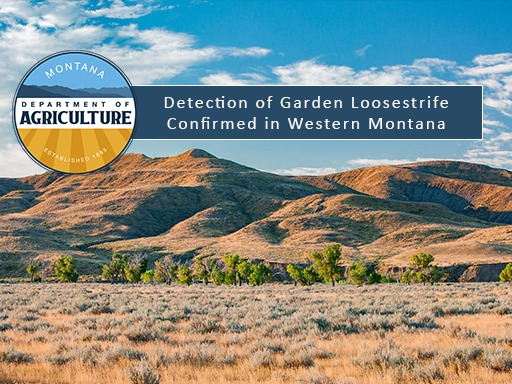Detection of Garden Loosestrife Confirmed in Western Montana

CONTACT:
Logan Kruse, Montana Department of Agriculture, (406) 444-3684
Joshua Wagoner, Montana Department of Agriculture, (406) 444-7880
Detection of Garden Loosestrife Confirmed in Western Montana
HELENA, Mont. – The Montana Department of Agriculture (MDA) confirmed Garden Loosestrife at two different sites in Western Montana. These are the first cases of Garden Loosestrife confirmed in Montana.
Garden loosestrife (Lysimachia vulgaris), an aggressive non-native wetland plant, has been found in western Montana. In July 2023, approximately 0.1 acres along the Stillwater River, west of Kalispell, and an additional 0.2 acres along the Bitterroot River in Hamilton were mapped and treated by local land managers and MDA’s Early Detection, Rapid Response (EDRR) Program. Monitoring will be conducted on both sites and adjacent lands for the next several years.
Garden loosestrife is a Class A (highest priority) noxious weed in Oregon, a Class B (second highest priority) in Washington and is invasive and problematic in several other states. It is a rhizomatous perennial forb that grows three to six feet tall and can form dense stands along waterways and in riparian areas. The leaves are opposite or whorled in groups of three to five, lance-shaped, three to five inches long and softly hairy, which gives them a slightly grayish-green tinge. Flowers are yellow, have five petals, appear in clusters at stem ends toward the top of the plant, and bloom in July or August.
Purple loosestrife (Lythrum salicaria), a Montana-listed Priority 1B noxious weed, has many shared physical characteristics and occupies the same type of riparian areas. Montana has two closely related natives, also with yellow flowers: fringed loosestrife (Lysimachia ciliata) and water loosestrife (Lysimachia thyrsiflora).
To report a suspected Garden Loosestrife plant, contact your local county weed district, MSU Extension agent, or the Montana Department of Agriculture. Leave the plant in the ground so it can be correctly identified, take plenty of pictures, record GPS coordinates, and arrange for a site visit as soon as possible. For additional resources and contact information, visit the Early Detection, Rapid Response webpage here: agr.mt.gov/Noxious-Weeds.
The Montana Department of Agriculture is serving Montana Agriculture and growing prosperity under the Big Sky. For more information on department programs and services, visit agr.mt.gov.
###
Tags: Noxious Weeds and EDRR
